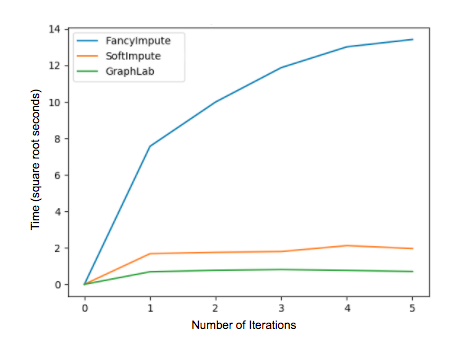SparseMF is a matrix factorization recommender written in Python, which runs on top of NumPy and SciPy. It was developed with a focus on speed, and highly sparse matrices. The package is available via pip.
Use SparseMF if you need a recommender that:
- Runs quickly using explicit recommender data
- Supports scipy sparse matrix formats
- Retains the sparsity of your data during training
This repo introduces two sparse matrix factorization algorithms. The algorithms were originally introduced by Trevor Hastie et al. in a 2014 paper "Matrix Completion and Low-Rank SVD via Fast Alternating Least Squares" as an extention to SoftImpute, which was introduced in 2009. A sparse implementation of each of these algorithms is introduced here. Both borrow from the FancyImpute python dense implementation of the 2009 SoftImpute algorithm. With large, sparse matrices, this version is significantly faster at predicting ratings for user/item pairs. To learn more about the differences between the two algorithms, read Trevor Hastie's vignette.
SparseMF is simple to use. First, install the package via pip:
pip install sparsemf
Next, choose the algorithm you would like to import, SoftImpute or SoftImputeALS and use it as follows:
from sparsemf import SoftImpute
model = SoftImpute()
X = my_data
model.fit(X)
model.predict( [users], [items] )Here is how the speed of SparseMF stacks up against GraphLab and FancyImpute:
In addition to these 'SoftImpute' and 'SoftImputeALS', the package also includes:
- 'SPLR' - A new sparse matrix class, entitled Sparse Plus Low Rank (SPLR), as described in the 2009 paper 'Spectral Regularization Algorithms for Learning Large Incomplete Matrices'.
- 'SBiScale' - A sparse approach to scaling and centering, row-wise and column-wise.
This GitHub repo also includes:
- Unit tests for SoftImpute.
- Benchmarking for SoftImputeALS against GraphLab and the FancyImpute SoftImpute implementation.
Here are some helpful resources:
